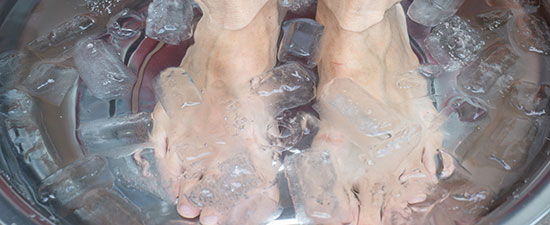
What causes burning feet when walking or running? Here are the most common culprits and simple solutions you can try at home.
Dedicated runners (and serious walkers) often experience a burning sensation in their feet after their favorite form of exercise. It’s natural, of course, for your feet to warm up as you run. The blood flow to and from your feet increases as your heart pumps faster, and there is inevitable friction in the interplay between your feet, your socks, and your shoes.
When overheating becomes significantly painful or even somewhat disabling, it’s time to pay attention and take some remedial steps. Most instances of burning feet can be easily alleviated at home. But burning feet can also be a symptom of medical conditions like athlete’s foot and nerve damage such as peripheral neuropathy, perhaps caused by incipient diabetes, pernicious anemia, or circulatory disorders.
What to do when your feet feel like they’re on fire
- The simplest first treatment for hot feet is to soak your feet in cool water. Don’t pack your feet in ice; that can cause additional harm, rather than relief.
- Before your next run or walk, lubricate your feet with an over-the-counter anti-blister/chafing product.
- After your run, get out of your shoes and socks immediately and let your shoes dry unconfined (out of your gym bag). Rotate your shoes and socks, and don’t wear worn-out shoes, which contribute to friction.
- Be careful with how you lace up your shoes. Too loose, and you’ll have too much friction causing movement within the shoe, too tight, and you will constrict circulation and perhaps irritate the nerves on top of your feet.
The right socks will help keep your feet cool
The fabric between your feet and your shoes is essential to healthy runners’ footcare. Stay away from cotton. It’s a great natural fiber for many applications, but not so much for running socks. It retains sweat, keeps the foot wet, and is a leading cause of burning feet.
Wear socks made of artificial fibers that wick the sweat away from your feet, and let the evaporation cool them down. Wool socks should be avoided because they can cause an itching and burning sensation in the feet. However, if you must have wool, itch-free wool is available.
Make sure your shoes can breathe
Full leather shoes, with no mesh or other provisions for adequate air circulation, will retain the heat generated by the friction between your foot, your socks, and your shoe.
Your feet naturally swell when you walk or run, so take that fact into account when shopping for shoes. However, make sure that you don’t overcompensate, because shoes that are too large will allow too much foot movement within them, which also contributes to excess heat as a result of excess friction.
Make sure your shoes are adequately cushioned, and that your insoles are not too worn down.
Some people can have an allergic reaction to the fabric, glue, dyes, or leather tanning chemicals in shoes, so check to see if your hot feet are worse in any particular pair of shoes. (The same goes for socks because an allergy can react to the fabrics or dyes in a pair of socks.)
Athlete’s foot is a common fungal infection that can lead to burning feet
Athlete’s foot will often make your feet burn. It’s a common foot problem that causes itching, redness, scaling, or cracking.
Be certain to let your shoes completely dry out between runs, because the athlete’s foot fungus thrives in damp places. Wash and dry your feet after each run. If you have a fungus that persists, there are many effective over-the-counter remedies available for athlete’s foot. But if any of these problems persist after you’ve used the appropriate self-care tactics, please don’t hesitate to make an appointment with UFAI. The doctors at University Foot and Ankle Institute are here to help.
Our nationally recognized podiatrists and foot and ankle specialists offer the most advanced foot and ankle care along with the highest success rates in the nation. We are leaders in the field of research and treatment of all foot and ankle conditions.
For more information or to schedule a consultation, please call (877) 736-6001 or visit us at www.footankleinstitute.com.
- Flip-flops Causing You Pain? Protect Your Feet This Summer! - April 23, 2024
- 9 Running Tips from Sports Medicine Experts - November 8, 2023
- Common Foot Problems In Aging Feet: What To Watch Out For - October 16, 2023
Leave a Reply